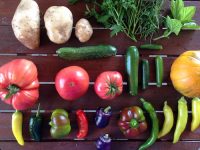Businesses in the organic food supply chain have just weeks to prepare for the upcoming implementation of the United States Department of Agriculture (USDA)’s Strengthening Organic Enforcement (SOE) Rule. This updating regulation, which goes into effect on March 19, 2024, aims to fortify the integrity of USDA organic products. From manufacturers to retailers, businesses across the supply chain must adjust their procedures and practices to comply with the updated rule.
The SOE Rule calls for the implementation of more rigorous certification practices for various types of businesses, including key links in the organic supply chain such as importers, exporters, brokers, traders and storage facilities. Because these organizations have not historically been required to be certified, it’s likely there will be an increase in last-minute organic certification applications. To accommodate the incorporation of these new entities, USDA-accredited certifying agents are now offering expanded services, including on-site inspections with enhanced authority to prevent fraud and non-compliance.
Changes Throughout the Supply Chain
Business activities that encompass any form of aggregating, culling, packaging, repackaging, storing or related processes of USDA organic products are now required to obtain certified organic status. In addition to a broader spectrum of handlers throughout the supply chain requiring certification, low-risk businesses in the exempt category must still adhere to stringent contamination prevention protocols and maintain meticulous records. This underscores the integral role of record-keeping and anti-fraud systems throughout the supply chain. To find out if your business should seek organic certification, try NSF’s interactive online decision tree tool.
Next Steps to Compliance
The USDA estimates that 1,000 domestic businesses will need to achieve organic certification prior to the Rule going into effect. Businesses must work with an independent, third-party certification body that is accredited by the USDA, such as Quality Assurance International (QAI), an NSF company, to secure certification. Once certified, labels—including non-retail and bulk labels—must be updated to demonstrate compliance.
The organic certification process involves completing an application, submitting documentation, an on-site inspection and technical review. To achieve certification, the applying business must resolve any noncompliances in a timely manner. After successfully completing the inspection and technical review process, the business will receive an official, numbered certificate and can then use the organic mark on its product labels. The certificate will also be added to the Organic Integrity Database and will be downloadable by the public. Each certificate includes a Scope and Product Summary Addendum.
The SOE Rule also calls for a mandatory electronic National Organic Program (NOP) Import Certificate for any organic product entering the US, regardless of the country of origin.
A crucial component of compliance with the Rule is creating or updating an Organic Systems Plan (OSP). An OSP acts as both an economic management tool and a contract between certifiers and certified operations and comprises a description of practices, list of substances, monitoring practices, recordkeeping systems, contamination prevention plans and specific information pertaining to an operation. This document safeguards organizations through supply chain traceability and organic fraud prevention procedures and is required for organic certification.
In addition to the requirements for businesses under the SOE Rule, USDA–accredited certifiers will provide enhanced oversight through possible unannounced inspections, inspector training, trace-back and mass balance audits, and new rules specifically for grower groups.
QAI and NSF offer a free SOE Rule toolkit to support organizations across the supply chain. The toolkit includes an interactive decision tree, FAQs, readiness checklist and links to educational webinars.






